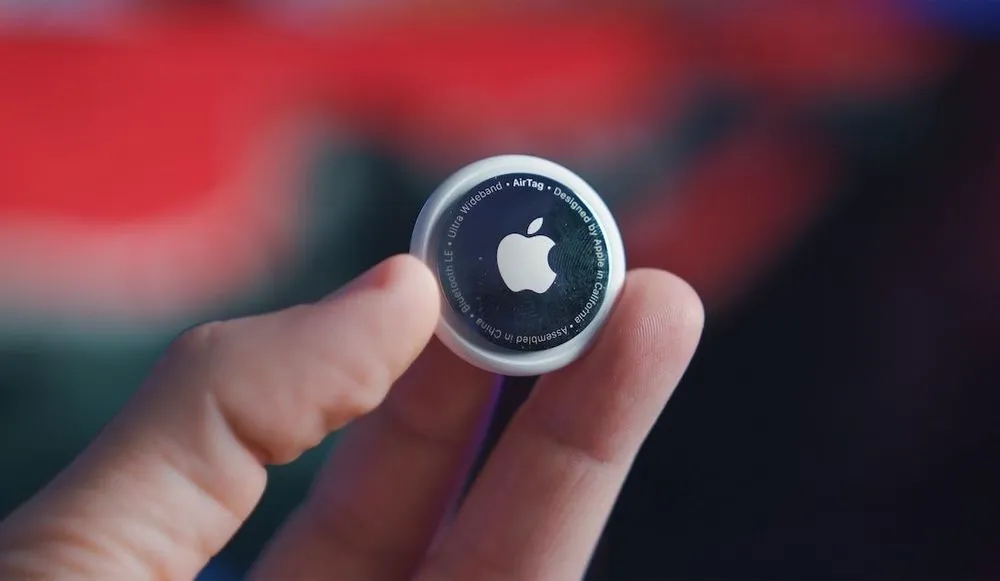In AirTags stalking lawsuit, federal judge says Apple likely negligent
A San Francisco-based federal judge said he believes Apple was likely negligent in its design and oversight of the AirTags tracking product, signaling he is leaning toward denying the company’s motion to dismiss a class action lawsuit brought by stalking victims who charge the device empowered their abusers.
U.S. District Judge Vince Chhabria said his “tentative view” was that the plaintiffs’ lawyers in the case “adequately alleged a negligence claim on the part of the California Plaintiffs under California law,” according to a transcript of a hearing made public last week.
Chhabria said his opinion on whether Apple can be held responsible for product liability damages is less certain, but he indicated he believes the company is potentially culpable on those grounds as well.
AirTags, which are priced at as little as $29, deliver signals by Bluetooth, allowing nearby devices to locate their whereabouts. Apple markets them as a way to locate misplaced keys and other lost items. AirTags also can be planted on consumers’ property, allowing stalkers to very easily track them.
The judge suggested he thinks Apple should have foreseen the stalking problem, an important element of a negligence claim.
Citing plaintiffs’ allegations that he called “well pled,” Chhabria said that when Apple announced it was going to launch AirTags “lots of people were screaming from the rooftops that, you know, you can't do this … you're basically putting out a product for stalkers.”
Chhabria also agreed with the plaintiffs’ claims that they “suffered extreme emotional harm” due to how AirTags facilitated stalking, a claim he called just as valid as suffering physical harm.
“To the extent that you're suggesting that we need to be treating, for lack of a better word, emotional injuries different from physical injuries, that's sort of an outmoded concept in California law,” Chhabria told an Apple lawyer arguing that emotional harm is less significant than physical harm in terms of negligence law..
Victims “stalked relentlessly for years by a psycho using the AirTag” are considered to have been significantly harmed, too, Chhabria said.
The judge suggested he would not consider claims from plaintiffs from outside of California and acknowledged that plaintiffs’ attorneys were “throwing a ton of mud at the wall and hoping that something sticks.”
But he added that he does “wonder” if “a couple of things have stuck.”
Apple did not respond to a request for comment.
Victims blame product design
Plaintiffs’ lawyer David Slade described the impact the stalking had on victims in the lawsuit, recalling that an Irish actress living in America to build her career moved home because she couldn’t locate an AirTag her stalker had placed in her car and couldn’t afford to have the car stripped to find it.
Slade argued that Apple did not make it possible, at the time the actress was stalked, for people being followed to locate an unwanted AirTag. He called it an example of Apple’s irresponsibility in designing the product.
“She ended up giving up her visa, giving up her acting and producing gigs and moving back home,” Slade said. “That is one instance off the top of my head that I believe had better safety features [been] in there … it would have mitigated the harm significantly.”
Chhabria also noted that AirTags have less value to society than other technologies like cell phones, which, for example, facilitate communication in important ways.
“Here we're talking about a device that helps — that makes it easier for people to find their keys or easier to find their car in a parking lot,” he said. “In terms of the benefits of the product, very, very different.”
He also said the fact that AirTags can be used by people engaging in “very serious criminal conduct” seems important.
“I feel fairly confident … that there is an extremely strong public policy in California for preventing people from being victims of stalking,” he said.
The judge asked Slade to weigh in on what Apple could have done to better design AirTags.
Slade acknowledged that Apple has since made many fixes. He said, however, that based on how AirTags were designed at the time of the stalking, he believes victims should have been alerted they were being subjected to unwanted tracking more quickly. He also said Apple should have provided more explicit explanations in notifications, and alerts should have been made more obvious to targets with louder sounds or other flags.
Chhabria said plaintiffs “do a pretty good job of alleging why the — you know, emitting that sound is not a particularly effective protection against becoming the victim of stalking through the use of AirTags.”
Suzanne Smalley
is a reporter covering digital privacy, surveillance technologies and cybersecurity policy for The Record. She was previously a cybersecurity reporter at CyberScoop. Earlier in her career Suzanne covered the Boston Police Department for the Boston Globe and two presidential campaign cycles for Newsweek. She lives in Washington with her husband and three children.



